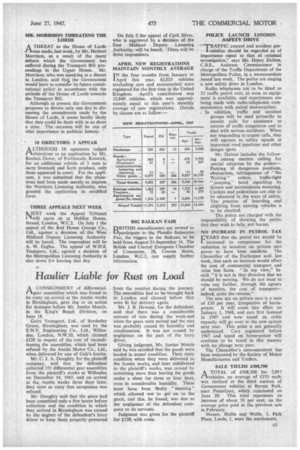Haulier Liable for Rust on Load A CONSIGNMENT of differential
Page 39

If you've noticed an error in this article please click here to report it so we can fix it.
gear assemblies which was found to be rusty on arrival at the Austin works in Birmingham, gave rise to an action for damages before Mr. Justice Morris, in the King's Bench Division, on June 18.
Gairs Transport, Ltd., of Bordesley Green, Birmingham, was sued by the E.N.V. Engineering Co., Ltd., Willesden, London, N.W.10, which claimed £120 in respect of the cost of reconditioning the assemblies, which had been refused by the Austin Motor Co., Ltd., when delivered by one of Gail's lorries.
Mr. C. J. A. Doughty, for the plaintiff company, said that the defendant collected 151 differential gear assemblies from the plaintiff's works at Willesden on December 14, 1945, and on arrival at the Austin works three days later, they were so rusty that acceptance was refused.
Mr. Doughty said that the gears had been assembled only a few hours before collection and the condition in which they arrived in Birmingham was caused by the neglect of the defendant's lorry driver to keep them properly protected from the weather during the journey. The assemblies had to be-brought back to London and cleaned before they were fit for delivery again.
Mr. J. B. Hewson, for the defendant, said that there was a considerable amount of rain during the week-end when the gears were moved and the rust was probably caused by humidity and condensation. It was not caused by negligence on the part of the lorry driver.
Giving judgment, Mr. Justice Morris said he was satisfied that the goods were loaded in sound condition. Their rusty condition when they were delivered to the Austin works, and later redelivered to the plaintiff's works, was caused by something more than leaving the goods under a sheet for three or four days, even in considerable humidity. There must have been faulty " sheeting " which allowed wet to get on to the gears, and this, he found, was due to the negligence of the defendant company or its servants.
Judgment was given for the plaintiff for £120, with costs.




































































































